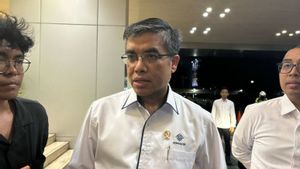JAKARTA - An economic and energy observer from Gadjah Mada University, Fahmy Radhi, asked the government to anticipate and make oil price projections which are the basis for making decisions regarding domestic fuel prices.
"As a net importer country, Indonesia has not benefited at all from the increase in oil prices. In fact, the soaring oil price has actually been detrimental and has made the burden on the state budget heavier," he said in a statement in Jakarta, Saturday as quoted by Antara.
Russia's military attack on Ukraine had raised world oil prices past USD 105 per barrel, which of course could have an impact on oil prices in Indonesia.
If the fuel price is not raised and is still sold below the economic price, explained Fahmy, then Pertamina has the potential to bear the burden of losses that will have an impact on the company's financial performance.
According to him, the government will reimburse Pertamina for the loss in the form of compensation funds, so that the increase in world oil prices will not have much impact on Pertamina, but will increase the burden on the state budget.
VOIR éGALEMENT:
"The government must decide on a policy on fuel prices to reduce the burden on the state budget," said Fahmy.
He conveyed that there are three policies that the government must decide, namely increasing the price of Pertamax according to the market price, removing premiums that are high in subsidies, and not increasing Pertalite prices by diverting Premium subsidies.
The increase in the price of Pertalite will have a domino effect because the number of consumers of this type of fuel is the largest with the proportion reaching 63 percent which can increase inflation and reduce people's purchasing power.
"In addition, the government needs to make proportional adjustments to the ICP in accordance with developments in world oil prices," concluded Fahmy.
In previous reports, Pertamina stated that it would consistently maintain upstream to downstream operational performance in order to increase energy security and maintain supply stability for national consumption needs amid rising world crude oil prices.
The Company has various sources of supply of crude oil, fuel products, and LPG from within the country as well as from many other countries, so that it has supply flexibility.
The Ministry of Energy and Mineral Resources is committed to continuing to monitor the movement of world oil prices due to the impact of geopolitical tensions between Russia and Ukraine, considering that some of Indonesia's crude oil and fuel oil are still imported.
During the last six months, the price of Indonesian oil or ICP showed an upward trend starting in August 2021 at 67.8 US dollars per barrel and continued to increase every month until January 2022 which touched a price of 85.9 US dollars per barrel.
The English, Chinese, Japanese, Arabic, and French versions are automatically generated by the AI. So there may still be inaccuracies in translating, please always see Indonesian as our main language. (system supported by DigitalSiber.id)


















